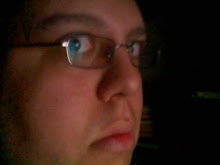Also, there's a naked blue guy who metaphorically represents "the bomb" and exists outside of time and space, and for some reason he's hanging out with the American government. I guess that doesn't make a lot of sense, but he looks neat, and can generate his own clothes. I wish I could generate my own clothes.
The host at a fancy restaurant would be like, "I'm sorry sir, but we require you to wear a jacket, allow me to clothe you in one of our own house jack-" and then he'd freeze, slack-jawed, because I'd suddenly be wearing a perfectly reconstructed Hugo Boss tuxedo, and then I'd say, "Sorry, sir, but I prefer to dress myself." Then everyone in the restaurant begins laughing, except for the host, who is hanging his head in shame as he turns in his name tag.
The Mountain Goats made a new video. They're a lyric-driven band who I like a lot. This song isn't bad, but the lyrics seem a little more generic than a lot of their other stuff. Either way, the video is neat.




